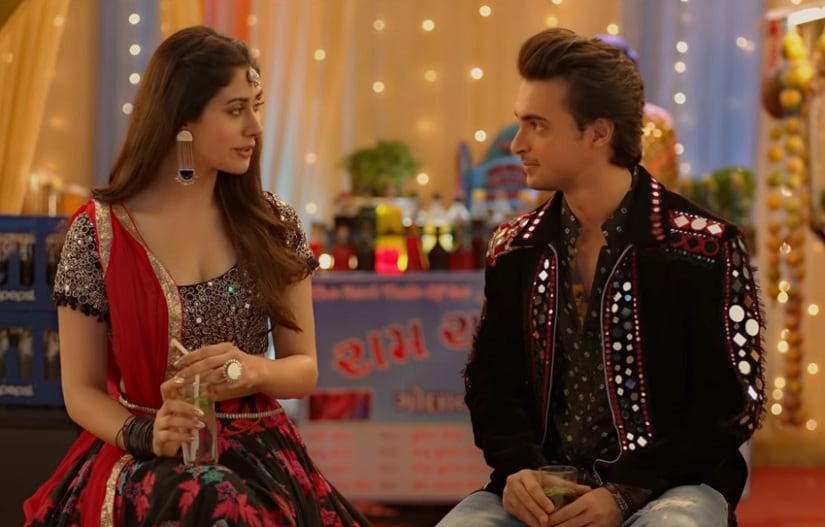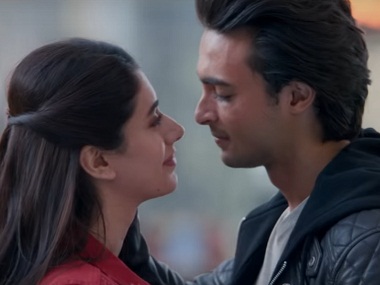Earlier this year, Hindi cinema went big on folk pop with ‘
Ghoomar
’ in Sanjay Leela Bhansali’s period drama
Padmaavat,
set in Rajasthan. Now, in Abhiraj Minawala’s upcoming musical
Loveyatri: A Journey of Love
, the composers have turned their attention to Gujarat. Since the film releases in the week of the Navratras, the makers have been trying to position their three folk pop songs accordingly. But besides the spirited ‘
Chogada
’, no folk pop song rings a bell as much as the remaining two non-folk songs of the five-track album. [caption id=“attachment_4901611” align=“alignnone” width=“825”]
 Warina Hussain and Aayush Sharma in a still from Loveratri[/caption] ‘Chogada’ paints a vivid picture of colours and grandeur. Inspired from the devotional garba song ‘O Sheronwali’ from Laxmikant-Pyarelal’s 1979 film Suhaag, ‘Chogada’ is rehashed into a romantic dance number. While the hook tune is familiar, DJ Chetas and Lijo George pack in enough of original score for the song to sound fresh. They use a number of folk Gujarati instruments like Sundari and Surando, keeping the essence of the song intact. Also, like they did with ‘
Kamariya
’ in Nitin Kakkar’s
Mitron
recently, they use mild EDM to only complement the folk appeal, rather than allowing the beats to eclipse the folk flavour of the song. Shabbir Ahmed and Darshan Raval work around the tune and turn the devotional song into a romantic track through the lyrics of the stanzas. Darshan Raval, who recently shot to fame with Gujarati folk pop songs ‘Kamariya’ and ‘Sanedo’ in Mitron, is equally earnest in both the soft, intimate stanzas and the energetic chorus of the song. By this balancing act, he may have just earned himself a well-deserved best singer nomination in the award season next year. Tanishk Bagchi, the pioneer of Bollywood rehashes, ironically composes several original songs in Loveyatri. ‘
Rangtaari
’ has a familiar folk tune which is vibrant but does not budge from its linear curve. Shabbir Ahmed’s lyrics also, besides a couple of lines on Krishna and Radha slid in, sound more like a ’90s song than a Gujarati folk number. Yo Yo Honey Singh and Hommie Dilliwala’s rap sequence appears so fleetingly that it stands as only an inconsequential fraction of the song. The vocals of Dev Negi, who delivered the impressive ‘
Chalti Hai Kya 9 Se 12
’ in David Dhawan’s comedy Judwaa 2 last year, sound muted. It is certainly not one of his better songs. The third folk pop song, ‘Dholida’, is better than ‘Rangtaari’ but not as addictive as ‘Chogada’. The rhythm is also quite different from ‘Chogada’. It is more relaxed but it never resorts to a liner approach like how ‘Rangtaari’ does. There is a Sarangi which merrily joins a host of seasoned singers. Tanishk Bagchi uses a number of ingredients like Raja Hassan’s additional folk vocals, the raw voice of Udit Narayan, the dreamy voice of Palak Muchchal and the zany vocals of Neha Kakkar to make his song more colourful. The four diverse singers act like his orchestra that strikes a balance between traditional folk instruments and contemporary beats. Shabbir Ahmed’s lyrics are also very rooted in the Gujarati flavour as he uses the metaphors of saavan (downpour) and Uttaran (the kite flying festival) as tools to express love in this garba song. [caption id=“attachment_4478815” align=“alignnone” width=“825”]
Warina Hussain and Aayush Sharma in a still from Loveratri[/caption] ‘Chogada’ paints a vivid picture of colours and grandeur. Inspired from the devotional garba song ‘O Sheronwali’ from Laxmikant-Pyarelal’s 1979 film Suhaag, ‘Chogada’ is rehashed into a romantic dance number. While the hook tune is familiar, DJ Chetas and Lijo George pack in enough of original score for the song to sound fresh. They use a number of folk Gujarati instruments like Sundari and Surando, keeping the essence of the song intact. Also, like they did with ‘
Kamariya
’ in Nitin Kakkar’s
Mitron
recently, they use mild EDM to only complement the folk appeal, rather than allowing the beats to eclipse the folk flavour of the song. Shabbir Ahmed and Darshan Raval work around the tune and turn the devotional song into a romantic track through the lyrics of the stanzas. Darshan Raval, who recently shot to fame with Gujarati folk pop songs ‘Kamariya’ and ‘Sanedo’ in Mitron, is equally earnest in both the soft, intimate stanzas and the energetic chorus of the song. By this balancing act, he may have just earned himself a well-deserved best singer nomination in the award season next year. Tanishk Bagchi, the pioneer of Bollywood rehashes, ironically composes several original songs in Loveyatri. ‘
Rangtaari
’ has a familiar folk tune which is vibrant but does not budge from its linear curve. Shabbir Ahmed’s lyrics also, besides a couple of lines on Krishna and Radha slid in, sound more like a ’90s song than a Gujarati folk number. Yo Yo Honey Singh and Hommie Dilliwala’s rap sequence appears so fleetingly that it stands as only an inconsequential fraction of the song. The vocals of Dev Negi, who delivered the impressive ‘
Chalti Hai Kya 9 Se 12
’ in David Dhawan’s comedy Judwaa 2 last year, sound muted. It is certainly not one of his better songs. The third folk pop song, ‘Dholida’, is better than ‘Rangtaari’ but not as addictive as ‘Chogada’. The rhythm is also quite different from ‘Chogada’. It is more relaxed but it never resorts to a liner approach like how ‘Rangtaari’ does. There is a Sarangi which merrily joins a host of seasoned singers. Tanishk Bagchi uses a number of ingredients like Raja Hassan’s additional folk vocals, the raw voice of Udit Narayan, the dreamy voice of Palak Muchchal and the zany vocals of Neha Kakkar to make his song more colourful. The four diverse singers act like his orchestra that strikes a balance between traditional folk instruments and contemporary beats. Shabbir Ahmed’s lyrics are also very rooted in the Gujarati flavour as he uses the metaphors of saavan (downpour) and Uttaran (the kite flying festival) as tools to express love in this garba song. [caption id=“attachment_4478815” align=“alignnone” width=“825”]
 Aayush Sharma and Warina Hussain in a still from Loveratri[/caption] The gem of this album is also a dance number but has no signs of any folk influence. ‘
Akh Lad Jaave
’ proves that Tanishk is capable of much more than just regurgitating hit Bollywood numbers. The rhythm of this club song is both meditative and addictive, as ironic as the combination sounds. Asees Kaur, who arrived with the romantic song ‘Bolna’ in Shakun Batra’s 2016 family drama Kapoor & Sons, transforms into a whole new avatar. Her voice sounds sensual more than sweet as she embraces the mood of this slow burn song. Jubin Nautiyal, another singer more popular for his soft romantic songs, follows suit. He maneuvers his gentle singing style to blend his vocals with Tanishk’s compelling tune. Badshah also adds to the song with a rap sequence and complements the main vocalists, instead of stealing the spotlight. Tanishk doubles up as a lyricist here. The words fit perfectly into the meter. He keeps the lyrics minimal, allowing his score to shine. Tanishk also comes up with a delightful romantic song in ‘
Tera Hua
’. While the skeleton of the song in itself is not bad, he incorporates a lot of varied elements to enhance the song. He uses mild EDM beats and even a Shehnai-like instrument to ensure that the reach of the song transcends the romantic buffs. Manoj Muntashir’s lyrics are sweet but they rely heavily on how they are positioned. Atif Aslam steals the show yet again by singing every word, every line like he has actually fallen in love for the first time. His impassioned vocals reiterate the fact that romantic songs and him will go a long way, hand in hand. Overall, the music of Loveyatri is big on folk pop but is not solely dedicated to the hybrid genre. The makers give equal importance to the romantic track and the club number, the two non-folk pop songs of the album. Also, despite the roots digging deeply into the Gujarati culture, the music does not alienate a pan-Indian audience. It highlights only the garba music that the rest of India is familiar with, without resorting to a liberal dose of Gujarati words, as is the case with Punjabi music across Bollywood for years. The Gujarati folk pop may not be as distinctive as ‘Shubhaarambh’ from Abhishek Kapoor’s 2013 film Kai Po Che!, but they do encapsulate the colours and moods of the Navratra season. Listen to the entire album
here
.
Aayush Sharma and Warina Hussain in a still from Loveratri[/caption] The gem of this album is also a dance number but has no signs of any folk influence. ‘
Akh Lad Jaave
’ proves that Tanishk is capable of much more than just regurgitating hit Bollywood numbers. The rhythm of this club song is both meditative and addictive, as ironic as the combination sounds. Asees Kaur, who arrived with the romantic song ‘Bolna’ in Shakun Batra’s 2016 family drama Kapoor & Sons, transforms into a whole new avatar. Her voice sounds sensual more than sweet as she embraces the mood of this slow burn song. Jubin Nautiyal, another singer more popular for his soft romantic songs, follows suit. He maneuvers his gentle singing style to blend his vocals with Tanishk’s compelling tune. Badshah also adds to the song with a rap sequence and complements the main vocalists, instead of stealing the spotlight. Tanishk doubles up as a lyricist here. The words fit perfectly into the meter. He keeps the lyrics minimal, allowing his score to shine. Tanishk also comes up with a delightful romantic song in ‘
Tera Hua
’. While the skeleton of the song in itself is not bad, he incorporates a lot of varied elements to enhance the song. He uses mild EDM beats and even a Shehnai-like instrument to ensure that the reach of the song transcends the romantic buffs. Manoj Muntashir’s lyrics are sweet but they rely heavily on how they are positioned. Atif Aslam steals the show yet again by singing every word, every line like he has actually fallen in love for the first time. His impassioned vocals reiterate the fact that romantic songs and him will go a long way, hand in hand. Overall, the music of Loveyatri is big on folk pop but is not solely dedicated to the hybrid genre. The makers give equal importance to the romantic track and the club number, the two non-folk pop songs of the album. Also, despite the roots digging deeply into the Gujarati culture, the music does not alienate a pan-Indian audience. It highlights only the garba music that the rest of India is familiar with, without resorting to a liberal dose of Gujarati words, as is the case with Punjabi music across Bollywood for years. The Gujarati folk pop may not be as distinctive as ‘Shubhaarambh’ from Abhishek Kapoor’s 2013 film Kai Po Che!, but they do encapsulate the colours and moods of the Navratra season. Listen to the entire album
here
.
Loveyatri marks the Bollywood debut of Aayush Sharma and Warina Hussain, and also stars Ram Kapoor. It is produced by Salman Khan Films and is slated to release this Friday on 5 October. All images from YouTube.
)